January 6, 2014 •
Our January Photo Scrapbook
Enjoy these fun photos from recent events!
Enjoy these fun photos from recent events!
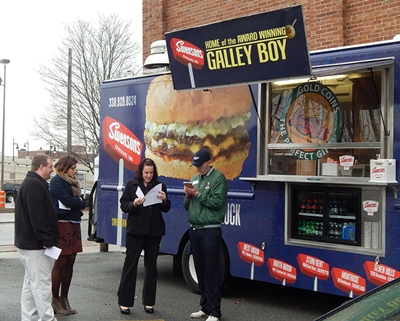
to enjoy a new lunch choice for a day. Businesses nearby and University of Akron students enjoyed this great surprise in downtown Akron.



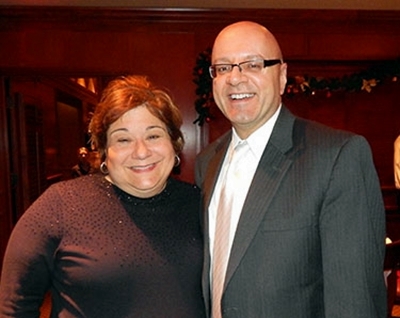

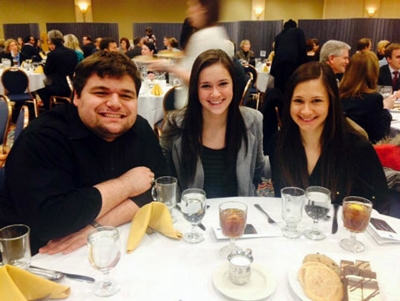
Seated left to right are Zack Koozer, Cristina Dickos, and Alessandra Dickos.
January 6, 2014 •
Virginia Gubernatorial Inauguration January 11
The inauguration for Virginia Governor-Elect Terry McAuliffe will be held Saturday, January 11, 2014 in Capitol Square in Richmond Virginia. The day will begin with a prayer breakfast, followed by the inauguration ceremony, parade, executive mansion open house, and the […]
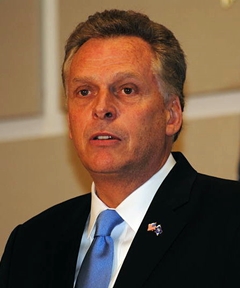 The inauguration for Virginia Governor-Elect Terry McAuliffe will be held Saturday, January 11, 2014 in Capitol Square in Richmond Virginia. The day will begin with a prayer breakfast, followed by the inauguration ceremony, parade, executive mansion open house, and the Richmond Inaugural Ball. More information is available at http://www.inauguration2014.com/.
The inauguration for Virginia Governor-Elect Terry McAuliffe will be held Saturday, January 11, 2014 in Capitol Square in Richmond Virginia. The day will begin with a prayer breakfast, followed by the inauguration ceremony, parade, executive mansion open house, and the Richmond Inaugural Ball. More information is available at http://www.inauguration2014.com/.
Virginia does not place any limits on the source or amount of political contributions or gifts, including to inaugural committees. Contributions to inaugural committees are not required to be reported on lobbying reports.
Photo of Virginia Governor-Elect Terry McAuliffe courtesy of Edward Kimmel on Wikimedia Commons.
The Iowa Ethics and Campaign Finance Disclosure Board has proposed a requirement for all campaign finance reports to be filed electronically. Currently, the only reports required to be filed electronically are those of legislative and statewide campaigns. In order for […]
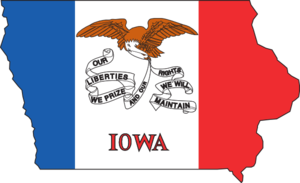 The Iowa Ethics and Campaign Finance Disclosure Board has proposed a requirement for all campaign finance reports to be filed electronically. Currently, the only reports required to be filed electronically are those of legislative and statewide campaigns.
The Iowa Ethics and Campaign Finance Disclosure Board has proposed a requirement for all campaign finance reports to be filed electronically. Currently, the only reports required to be filed electronically are those of legislative and statewide campaigns.
In order for the proposal to become law, it must be approved by the Iowa Legislature. An amendment to the bill allowing waiver by the state ethics board of the e-filing requirement for extenuating circumstances is likely to be considered by the House State Government Committee.
January 3, 2014 •
Proposed Changes in Canadian Lobbying Laws
If you’re planning to lobby north of the border, there are a number of changes on the horizon you should be aware of. This fall saw quite a bit of activity for Canadian lobbying legislation, with two provinces introducing laws […]
 If you’re planning to lobby north of the border, there are a number of changes on the horizon you should be aware of. This fall saw quite a bit of activity for Canadian lobbying legislation, with two provinces introducing laws to create a lobbyist registration framework and one making substantial changes to its existing law.
If you’re planning to lobby north of the border, there are a number of changes on the horizon you should be aware of. This fall saw quite a bit of activity for Canadian lobbying legislation, with two provinces introducing laws to create a lobbyist registration framework and one making substantial changes to its existing law.
Saskatchewan’s Lobbyist Act would create a registrar of lobbyists, provide requirements for filing returns, which is the Canadian term for the filing for both registrations and reports, and establish definitions and penalties. The act also provides for online filing of returns. The legislation is based on the recommendations of the Standing Committee on Intergovernmental Affairs and Justice issued in 2012.
Similarly, New Brunswick’s Lobbyists Registration Act establishes a basic framework for filing returns and penalties for violations. Prior attempts at creating a lobbyist registry failed in both 2007 and 2011. Saskatchewan and New Brunswick are two of the last three Canadian provinces without lobbying laws; the three Canadian territories also do not have lobbying laws. Both governments cited a desire for providing more transparency for their citizens as the impetus for the legislation.
Ontario introduced an Act to Amend the Lobbyists Registration Act, giving a new definition for grassroots lobbying, giving more specificity on what constitutes an undertaking to lobby, requiring in-house lobbyists to file monthly reports if the lobbying is directed at a high level public office holder, and adding a requirement to report campaign contributions made under the Election Finances Act. Additional changes include revolving door restrictions and changes to penalties. The bill is currently in the Standing Committee on Regulations and Private Bills.
January 3, 2014 •
Ask the Experts – Disclosure of Corporate Political Contributions
Q. When must direct corporate political contributions be disclosed? A. At least 15 states require some sort of corporate contribution disclosure, whether it be on a campaign finance statement or lobbyist/employer disclosure report. Campaign finance reports typically require an annual […]
 Q. When must direct corporate political contributions be disclosed?
Q. When must direct corporate political contributions be disclosed?
A. At least 15 states require some sort of corporate contribution disclosure, whether it be on a campaign finance statement or lobbyist/employer disclosure report.
Campaign finance reports typically require an annual aggregate threshold be exceeded before a report is triggered. For example, in Utah, direct corporate contributions must exceed $750 in the aggregate per calendar year before a report is required. In Georgia, the threshold is $25,000. In Nebraska, a corporation making more than $250 in direct corporate contributions must file a report within 10 days after the end of the calendar month in which the contribution is made.
Conversely, lobbying reports typically start at “dollar one.” In New Mexico, lobbyists are required to report all political contributions made by the employer, regardless of amount. The same holds true in South Carolina and New Hampshire.
And then there’s California—a hybrid of both campaign finance and lobbying disclosure. Direct corporate contributions must exceed $10,000 in the aggregate per calendar year before a campaign finance report is due. However, until this threshold is exceeded, corporate political contributions must be disclosed on the lobbyist employer’s quarterly report.
As always, the best practice is to track all corporate political contributions in the event disclosure is required. Likewise, you need to familiarize yourself with the reporting requirements in those jurisdictions where your company is making contributions.
You can directly submit questions for this feature, and we will select those most appropriate and answer them here. Send your questions to: marketing@stateandfed.com.
(We are always available to answer questions from clients that are specific to your needs, and we encourage you to continue to call or e-mail us with questions about your particular company or organization. As always, we will confidentially and directly provide answers or information you need.) Our replies to your questions are not legal advice. Instead, these replies represent our analysis of laws, rules, and regulations.
January 3, 2014 •
News You Can Use Digest – January 3, 2014
National: Social Conservatives Make Big Money Plans Politico – Kenneth Vogel | Published: 1/2/2014 The religious right’s wealthiest backers and top operatives plan to elevate the place of social issues like abortion and gay marriage in conservative politics. […]

National:
Social Conservatives Make Big Money Plans
Politico – Kenneth Vogel | Published: 1/2/2014
The religious right’s wealthiest backers and top operatives plan to elevate the place of social issues like abortion and gay marriage in conservative politics. They have been largely relegated to the sidelines as the business wing of the Republican Party establishment wages a bitter and expensive struggle against the tea party for the soul of the GOP.
Federal:
Lines Blur When Lobbyists Invest in Industries They Represent
Wall Street Journal – Brody Mullins, James Grimaldi, and Rebecca Ballhaus | Published: 12/26/2013
Through continual contact with public officials, lobbyists often glean intimate knowledge of pending policy changes and political activities that affect the fortunes of companies or industries they represent. Many also hold investments that overlap with their responsibilities, according to a review of public records. It showed about one in five lobbyists whose holdings could be identified had invested in their clients or companies in the industries they are concerned with.
From the States and Municipalities:
Arkansas – Ark. Lt. Gov. Rebuffs Calls to Resign amid Scandal
San Francisco Chronicle – Chuck Bartels (Associated Press) | Published: 12/31/2013
Arkansas Lt. Gov. Mark Darr, who said he would settle with his state Ethics Commission amid findings that he repeatedly broke campaign finance laws, defied mounting calls for his resignation, including one from Gov. Mike Beebe, and said he intended to remain in office. Darr has agreed to pay $11,000 in fines to settle the complaints.
California – Ex-Employee Accuses Lobbying Firm of Directing Illegal Contributions
Los Angeles Times – Patrick McGreevy and Paige St. John | Published: 12/26/2013
A lawsuit filed by former Sloat Higgins Jensen & Associates employee Rhonda Smira alleges owner Kevin Sloat and his firm directed illegal campaign contributions and unreported gifts to dozens of California lawmakers. Smira said she was ordered not to provide receipts for the gifts; that way, recipients could avoid disclosing the transactions on reports required by the state. The lawsuit says Sloat told her: “If I don’t report and there is no written record, and they don’t report it, then it didn’t happen.”
Georgia – Georgia Officials Take Lobbyist Gifts before New Rules
Augusta Chronicle – Ray Henry (Associated Press) | Published: 12/30/2013
Lobbyists splurged on gifts to Georgia lawmakers before restrictions took effect on January 1. Gov. Nathan Deal signed the new rules on May 6. While the state’s political leaders supported an end to unlimited lobbyist spending, the old system remained legal until New Year’s Day. Several politicians accepted gifts during this delay that would be illegal, or at least questionable, once the new restrictions start. Some questions about the law remain unresolved until the ethics commission creates rules interpreting the new law, a process that could take months.
Massachusetts – Teachers Union Revealed as Funder behind Pro-Walsh PAC
Boston Globe – Wesley Lowery | Published: 12/28/2013
The American Federation of Teachers was behind the last-minute, $480,000 advertising push on behalf of Boston Mayor-elect Martin Walsh, even though it was billed as the work of a start-up PAC dubbed One Boston. No information was disclosed at the time about One Boston’s ideological loyalties or donors, angering watchdog groups who had already been critical of the unprecedented amount of outside money that was flowing into the race, which ultimately became the state’s most expensive municipal contest ever.
Michigan – Gov. Snyder Signs Law to Double Michigan Campaign Contribution Limits, Codify ‘Issue Ad’ Rules
MLive.com – Jonathan Oosting | Published: 12/27/2013
Michigan Gov. Rick Snyder signed a bill doubling the state’s campaign contribution limits. The law includes a provision designed to thwart efforts by Secretary of State Ruth Johnson to reveal who pays for issue ads that have become increasingly influential in campaigns. Snyder said the law also increases transparency by requiring candidates to file additional campaign finance reports with the state during years in which they are not up for election.
Minnesota – Minnesota Political Spending Concentrated in Few Hands
Minneapolis Star Tribune – Rachel Stassen-Berger and Glen Howatt | Published: 12/30/2013
The Minneapolis Star Tribune found just three dozen individuals or entities have contributed more than $27 million to PACs and independent expenditure committees over the past three election cycles. The analysis shows the donations heavily favored Democrats. Minnesota Republicans acknowledged Democrats have benefited from superior organization, a more energized base, and campaign finance rules that make it easier for unions to donate.
Missouri – Missouri Lawmaker Wants Political Consultants to Stay Out of Policymaking
Kansas City Star – Dave Helling | Published: 12/24/2013
Missouri Sen. John Lamping filed an ethics reform bill that would prohibit consultants from working as lobbyists, and lobbyists from working as consultants. Lamping said operatives who help elect candidates should not be able to turn around and work for special-interest clients to influence those lawmakers, as is now routinely the case.
New York – Bratton Gives Revolving Door One More Spin
New York Times – J. David Goodman | Published: 12/23/2013
A “revolving door” between government service and the corporate world has long been a feature of politics, and police officials often pursue second careers after hanging up their uniforms. But few have done so with William Bratton’s scope. His return to New York City for a second tour as police commissioner may create an awkward situation. Bratton sits on the boards of two companies who hope to do business with the city, and is a senior adviser to a third.
North Carolina – New NC Law Increases Donation Limits, Curtails Some Disclosure in 2014
Raleigh News & Observer – John Frank | Published: 12/26/2013
North Carolina joined at least eight others states pushing for increases in campaign contribution limits this year. Starting January 1, state candidates and PACs can take maximum contributions of $5,000 per election. The top donation to judicial candidates will leap to the same level from the current $1,000 cap. The new law also weakens rules about what outside groups, such as nonprofits, issue advocacy organizations, and super PACs, must disclose.
South Carolina – S.C. Ethics Commission Owed $2.5 Million in Fines
Charleston Post & Courier – Seanna Adcox (Associated Press) | Published: 1/1/2014
Candidates, lobbyists, and committees owe nearly $2.5 million in fines to the South Carolina Ethics Commission. Under state law, individuals are fined $100 for filing either campaign disclosure or economic interest forms five days late. Once a notice goes out, fines amass daily, up to $5,000 per form. Collecting can be difficult, especially from unsuccessful candidates.
Texas – Texas Republicans Lose 3 Major Donors in 2013
Houston Chronicle – Chris Tomlinson (Associated Press) | Published: 12/30/2013
The deaths this year of three major Republican campaign donors could signal a generational change for party kingmakers. Harold Simmons, Bob Perry, and Leo Linbeck, Jr. gave to Republican candidates and organizations across the country, but their influence was greatest in Texas, which has no limit on personal campaign contributions.
Virginia – Ethics Reform Seems Uncertain in General Assembly
The Daily Press – Dave Ress | Published: 12/29/2013
After a year that saw Virginia Gov. Bob McDonnell and Attorney General Ken Cuccinelli embarrassed by reports of tens of thousands of dollars’ worth of gifts they accepted from a business executive, ethics is again a talking point in Richmond. Gov.-elect Terry McAuliffe plans to issue an executive order banning gifts of more than $100 to executive branch officials, but there is no consensus on whether the Legislature will enact reforms.
Wisconsin – With Audit on the Horizon, the Elections Board Spends another Year in the Crosshairs
Wisconsin State Journal – Mary Spicuzza | Published: 12/29/2013
The Wisconsin Government Accountability Board (GAB), which is made up of six former judges, and its staff are preparing to celebrate their sixth anniversary. But the board is also awaiting the results of an audit ordered by state lawmakers, many of whom have been vocal critics of the agency. “The GAB is a national model, and it would be a tragedy and a travesty if it were eliminated,” said Daniel Tokaji, a law professor at Ohio State University.
 State and Federal Communications produces a weekly summary of national news, offering more than 80 articles per week focused on ethics, lobbying, and campaign finance.
State and Federal Communications produces a weekly summary of national news, offering more than 80 articles per week focused on ethics, lobbying, and campaign finance.
News You Can Use is a news service provided at no charge only to clients of our online Executive Source Guides, or ALERTS™ consulting clients.
January 2, 2014 •
Chicago Board of Ethics Posts New Informational Brochures
The Chicago Board of Ethics recently posted two new publications on its website, both of which outline ethics restrictions for city officials. The first addresses, among other things, general conflicts of interest, lobbying on behalf of others, financial interests in […]
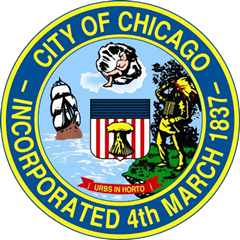 The Chicago Board of Ethics recently posted two new publications on its website, both of which outline ethics restrictions for city officials.
The Chicago Board of Ethics recently posted two new publications on its website, both of which outline ethics restrictions for city officials.
The first addresses, among other things, general conflicts of interest, lobbying on behalf of others, financial interests in city contracts, financial disclosure requirements, gifts, revolving door provisions, and penalties for ethics violations.
The second addition is a publication delineating what city employees and officials may or may not do in terms of contracting with the city.
Both documents are intended to provide a basic understanding of ethics rules and are not deemed legal advice.
Governor Rick Snyder signed a bill Friday revising Michigan’s campaign finance law. Under the new law, an individual will be able to donate up to $6,800 to a candidate for statewide office in a single election cycle, up from $3,400. […]
 Governor Rick Snyder signed a bill Friday revising Michigan’s campaign finance law. Under the new law, an individual will be able to donate up to $6,800 to a candidate for statewide office in a single election cycle, up from $3,400. An individual will be able to donate $2,000 for state House and Senate candidates, up from $1,000. Local candidate caps depend on the size of the community.
Governor Rick Snyder signed a bill Friday revising Michigan’s campaign finance law. Under the new law, an individual will be able to donate up to $6,800 to a candidate for statewide office in a single election cycle, up from $3,400. An individual will be able to donate $2,000 for state House and Senate candidates, up from $1,000. Local candidate caps depend on the size of the community.
The new law marks the first increase to state contribution limits since the late 1970s. The new law also requires the sponsors of “issue ads” to include disclaimers on their materials identifying the party responsible for the ad.
January 2, 2014 •
Kentucky Legislative Ethics Commission Offering Lobbyist Workshop
The Legislative Research Commission (LRC) will conduct an optional lobbyist workshop on Wednesday, January 8, 2014. Legislative leaders and LRC employees will provide information about the legislative process, bill tracking, and ethics requirements. The workshop will begin at 9:00 a.m. […]
 The Legislative Research Commission (LRC) will conduct an optional lobbyist workshop on Wednesday, January 8, 2014.
The Legislative Research Commission (LRC) will conduct an optional lobbyist workshop on Wednesday, January 8, 2014.
Legislative leaders and LRC employees will provide information about the legislative process, bill tracking, and ethics requirements.
The workshop will begin at 9:00 a.m. and will be held in Room 149 of the Capitol Annex in Frankfort.
January 2, 2014 •
WA Legislative Ethics Board Dismisses Complaint, Looks to Legislature for Guidance on Free Meals to Lawmakers
The Legislative Ethics Board in Washington dismissed a complaint related to Washington state lawmakers accepting free meals from lobbyists. Washington law prohibits public officials from accepting free meals on more than “infrequent occasions.” However, there is no enforceable standard for […]
 The Legislative Ethics Board in Washington dismissed a complaint related to Washington state lawmakers accepting free meals from lobbyists. Washington law prohibits public officials from accepting free meals on more than “infrequent occasions.” However, there is no enforceable standard for “infrequent occasions.”
The Legislative Ethics Board in Washington dismissed a complaint related to Washington state lawmakers accepting free meals from lobbyists. Washington law prohibits public officials from accepting free meals on more than “infrequent occasions.” However, there is no enforceable standard for “infrequent occasions.”
The complaint was prompted by a reported $65,000 being spent on free meals by the state’s most active lobbyists in the first four months of 2013.
The Ethics Board is turning to the Legislature for an enforceable standard for the ethics law. If the Legislature fails to do so in the upcoming session beginning in January, the board plans to establish its own rules.
The board also noted in its decision the lack of an enforceable standard affects the consistency of lobbyist reports in terms of what is being reported.
Photo of the Washington State Capitol by Nikopoley on Wikimedia Commons.
January 2, 2014 •
Massachusetts Special Election Called for State House Seat
A special election for the Massachusetts Fourth Hampden Representative District has been called to fill the vacancy caused by the resignation of state Representative Donald F. Humason, Jr. The Office of the Secretary of the Commonwealth William Galvin announced the […]
 A special election for the Massachusetts Fourth Hampden Representative District has been called to fill the vacancy caused by the resignation of state Representative Donald F. Humason, Jr.
A special election for the Massachusetts Fourth Hampden Representative District has been called to fill the vacancy caused by the resignation of state Representative Donald F. Humason, Jr.
The Office of the Secretary of the Commonwealth William Galvin announced the special primary election will be held on March 4, 2014. The general election will follow on April 1, 2014.
Humason resigned from the House after he was elected to the Senate for the 2nd Hampden-Hampshire District.
January 2, 2014 •
Georgia Lobbyist Gift Rules Set to Take Effect
Effective January 1, 2014, new rules generally ban lobbyists from providing public officials with gifts valued at more than $75 or any tickets to games, concerts, and other recreational events. The ethics overhaul in House Bill 142 provides the state’s […]
 Effective January 1, 2014, new rules generally ban lobbyists from providing public officials with gifts valued at more than $75 or any tickets to games, concerts, and other recreational events. The ethics overhaul in House Bill 142 provides the state’s first legislative limitation on gifts to public officials.
Effective January 1, 2014, new rules generally ban lobbyists from providing public officials with gifts valued at more than $75 or any tickets to games, concerts, and other recreational events. The ethics overhaul in House Bill 142 provides the state’s first legislative limitation on gifts to public officials.
Exceptions to the $75 limit include committee dinners, dinners for caucuses, and certain lobbyist-funded travel. The $75 cap is per occurrence and per lobbyist.
Although the bill was signed in May, 2013, lobbyists were permitted to provide unlimited gifts until the January 1 effective date.
December 28, 2013 •
News You Can Use Digest – December 27, 2013
Federal: Political Advertisers and TV Stations Ignore Disclosure Rules The Sunlight Foundation – Jacob Fenton | Published: 12/18/2013 The Bipartisan Campaign Reform Act of 2002 requires television stations to make available detailed information about political ad buys, including […]

Federal:
Political Advertisers and TV Stations Ignore Disclosure Rules
The Sunlight Foundation – Jacob Fenton | Published: 12/18/2013
The Bipartisan Campaign Reform Act of 2002 requires television stations to make available detailed information about political ad buys, including the names of any elected officials mentioned in the ads and any national issues discussed in them. But a review by the Sunlight Foundation reveals TV stations often fail to report even the most basic information about the political ads that outside groups buy on their airwaves.
Upstart Groups Challenge Rove for G.O.P. Cash
New York Times – Nicholas Confessore | Published: 12/23/2013
At least a dozen super PACs are setting up to back individual Republican candidates for the U.S. Senate, challenging the strategic and financial dominance that Karl Rove and the group he co-founded, American Crossroads, have enjoyed ever since the Supreme Court’s Citizens United decision cleared the way for unlimited independent spending. Some are suggesting Crossroads’ ties to the Republican establishment and recent clashes with conservative activists are a potential liability for GOP incumbents facing tea party challengers.
From the States and Municipalities:
California – Common Cause Seeks New Limits on Gifts to California Officials
Los Angeles Times – Patrick McGreevy | Published: 12/19/2013
California Common Cause proposed reforms to the state’s gift law to reduce the ability of special interests to seek favor by providing expensive meals, lodging, and travel. The group’s recommendations include applying the $10-per-month limit on gifts from lobbyists to also include gifts from the lobbyists’ clients, and reduce the limit on gifts that can be accepted by state elected officials from $440 per source annually to $250.
Georgia – State Ethics Commission Approves Hiring of ‘Internal Mediator’
WABE – Michelle Wirth | Published: 12/19/2013
The Georgia ethics commission hired former administrative law judge Robert Constantine to help with daily operations while federal authorities probe the agency’s investigation into Gov. Nathan Deal’s campaign. Several commission members received federal grand jury subpoenas over the matter. Chairperson Kevin Abernathy said Constantine will serve as an intermediary between the commission and staff members, and will have the ability to help resolve any disputes among agency employees.
Louisiana – Five Years Later, Does Gov. Bobby Jindal’s Ethics System Work?
Baton Rouge Advocate – Marsha Shuler and Mark Ballard | Published: 12/22/2013
At his January 2008 inauguration, Louisiana Gov. Bobby Jindal announced a special legislative session to repair the state’s ethics system, saying he wanted to create a “gold standard.” Some observers say the decrease in violations shows the changes gummed up the works by making proceedings more like criminal prosecutions, with more lawyers, motions, and delays. Supporters of the changes argue the previous system was simply unfair.
Maryland – Half of Md. Lawmakers with Twitter Accounts Neglect to Comply with Disclosure Rule
Washington Post – John Wagner | Published: 12/20/2013
All candidates in Maryland are supposed to include an “authority line” when they promote themselves on social media. The Washington Post identified 92 Twitter accounts maintained by the state’s 188 senators and delegates. Of those, only 45 included authority lines that identify the name of the campaign entity and its treasurer.
Maryland – Md. Elections Board: Brown’s running mate can raise money during legislative session
Washington Post – John Wagner | Published: 12/19/2013
The State Board of Elections cleared the way for Maryland Lt. Gov. Anthony Brown’s gubernatorial campaign to raise money during the legislative session despite a law preventing state officials from seeking contributions during that period. The ruling addressed the issue of gubernatorial candidates and their political partners seeking to be lieutenant governor. While Brown, as a state official, cannot raise money during the session, his running mate, Howard County Executive Ken Ulman, is a local official and thus free to do so.
Lexology.com – Alexandra Megaris | Published: 12/17/2013
The New York City Council passed an ordinance revising the lobbying law. The definition of “lobbying” has been expanded, the schedule for filing reports was changed, and the dollar threshold for determining whether registration is required has been increased from $2,000 to $5,000 per calendar year, among other provisions. Most of the law takes effect on May 8, 2014; the registration threshold will become effective on January 1.
Oklahoma – Lawmakers’ Disclosures Reveal Little on Finances
Tulsa World – Curtis Killman | Published: 12/23/2013
Some are questioning what is required to be reported and the value of the information revealed to the public on Oklahoma lawmakers’ financial disclosure reports. In an age of growing transparency, the disclosure requirements provide little information when compared to congressional standards or those in other states.
Utah – More Swallow Revelations: Pay to play, hidden donations
Salt Lake Tribune – Robert Gehrke | Published: 12/20/2013
Investigators for the House Special Investigative Committee said former Utah Attorney General John Swallow and his predecessor, Mark Shurtleff, gave big donors extraordinary access in exchange for campaign contributions and special favors. The revelations upset committee members and several said they now want to continue the five-month probe that was shut down after Swallow announced his resignation.
Virginia – Chef Speaks Out about Va.’s McDonnells
Washington Post – Rosalind Helderman | Published: 12/21/2013
For months, Todd Schneider, the former chef at the governor’s mansion, has been the dramatic but silent figure who launched an investigation that has threatened to bring down Virginia Gov. Robert McDonnell. But he said now that his case is resolved and the governor is ending his term, it is time to speak out. It was Schneider who first alerted authorities that businessperson Jonnie Williams had paid for catering at the wedding of one of McDonnell’s daughters, a tip that spiraled into a broad criminal probe that has brought the governor to the brink of federal charges.
Washington – Washington Ethics Panel Tosses Free Meal Complaint, Encourages Legislature to Clarify Statute
Columbus Republic – Rachel LaCorte (Associated Press) | Published: 12/20/2013
The Legislative Ethics Board dismissed a complaint about some Washington lawmakers accepting free meals from lobbyists. The board said if the state Legislature does not address the issue in the 60-day session beginning in January, the panel will work to establish rules on an enforceable standard.
 State and Federal Communications produces a weekly summary of national news, offering more than 80 articles per week focused on ethics, lobbying, and campaign finance.
State and Federal Communications produces a weekly summary of national news, offering more than 80 articles per week focused on ethics, lobbying, and campaign finance.
News You Can Use is a news service provided at no charge only to clients of our online Executive Source Guides, or ALERTS™ consulting clients.
December 24, 2013 •
NYC Revises its Lobbying Law
New York’s City Council passed legislation this week containing many changes to lobbying regulations. The majority of the law’s provisions take effect May 8, 2014. As part of the new law, the definition of “lobbying” has been expanded to include […]
 New York’s City Council passed legislation this week containing many changes to lobbying regulations. The majority of the law’s provisions take effect May 8, 2014.
New York’s City Council passed legislation this week containing many changes to lobbying regulations. The majority of the law’s provisions take effect May 8, 2014.
As part of the new law, the definition of “lobbying” has been expanded to include attempts to influence “any determination made by an elected city official or an officer of employee of the city to support or oppose any state or federal legislation, rule or regulation.”
This provision is unique because very few cities regulate lobbying a city official to weigh in on state or federal policy. The new law also directs the City Clerk to search for noncompliance with registration requirements by scouring public records.
Further, lobbyists will be required to file six periodic reports each year, up from four reports under the outgoing law. Also, as of January 1, 2014, the registration threshold will increase from $2,000 to $5,000 per calendar year.
Photo of Manhattan by AngMoKio in Wikimedia Commons.
State and Federal Communications, Inc. provides research and consulting services for government relations professionals on lobbying laws, procurement lobbying laws, political contribution laws in the United States and Canada. Learn more by visiting stateandfed.com.

